Sabah Sabah
A Destination for Eco Adventures A Destination for Eco Adventures
Stunning tropical islands and luxuriant nature makes Sabah the ideal destination for eco-adventures. The state’s most famous icon is the majestic Mount Kinabalu, reputed to be one of the highest in Southeast Asia, Another jewel is Sipadan, an internationally-famed dive destination.
Its population is made up of 32 ethnic communities. The capital of Sabah is Kota Kinabalu. It is the gateway to eco-adventures such as diving, river cruising, mountain climbing, white-water rafting and caving. Kota Kinabalu was formerly known as Jesselton. Most parts of the city have been reconstructed after World War II and there are only three surviving buildings from the war.
Visit this “Land Below the Wind’ and enjoy unforgettable adventures!
Map of Sabah
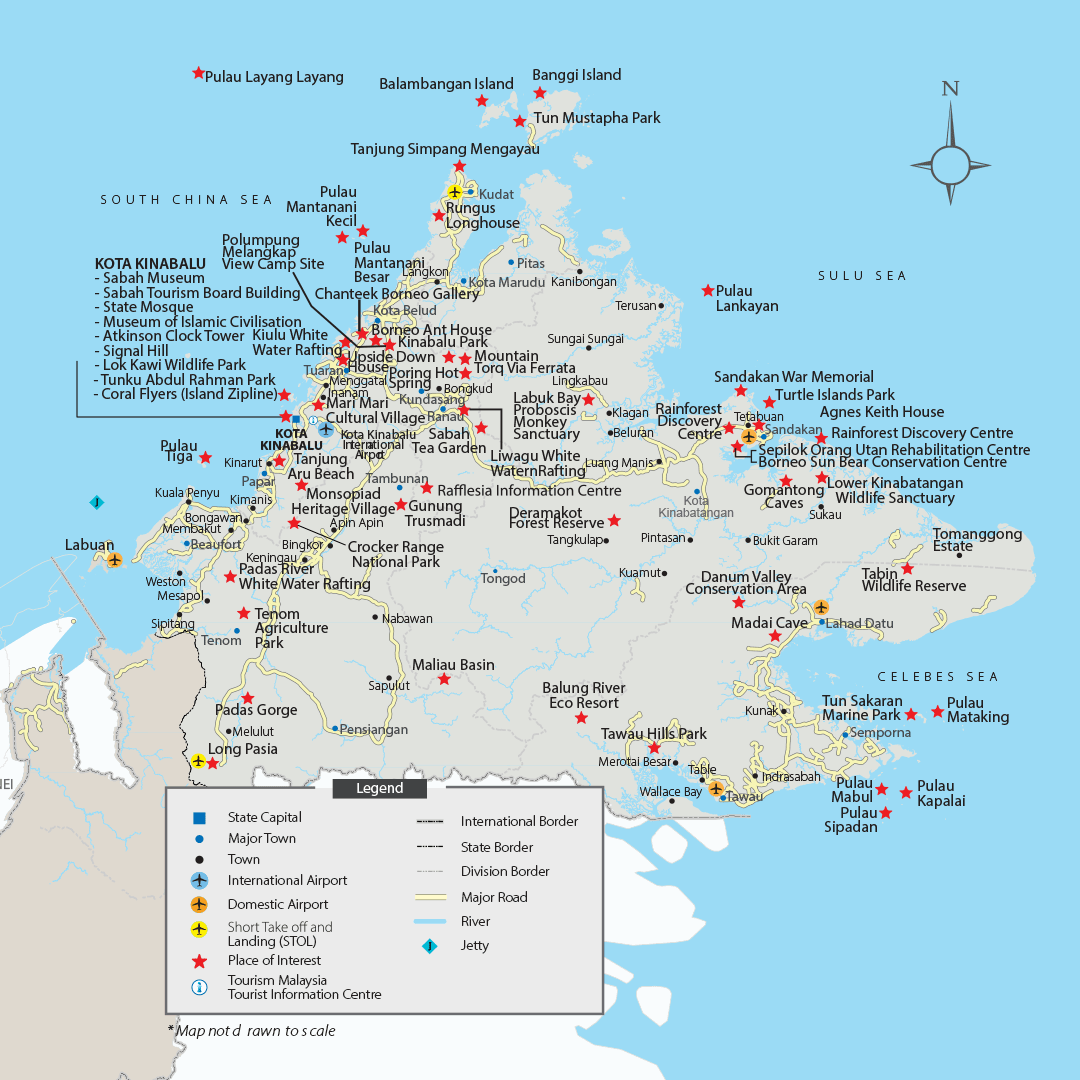
Places of Interest
TUNKU ABDUL RAHMAN PARK
Kota Kinabalu
Made up of a cluster of five islands – Pulau Gaya, Pulau Manukan, Pulau Mamutik, Pulau Sapi and Pulau Sulug –Tunku Abdul Rahman Park’s crystal-clear waters is filled with an abundance of corals and aquatic species. Popular among eco-tourists, the park’s relatively-shallow waters are perfect for snorkellers and novice divers. Pulau Gaya is the largest island and is the site of a luxury resort.
MOUNT KINABALU
(Malaysia’s first UNESCO World Heritage Site)
Standing at 4,095.2m above sea level, Mount Kinabalu is one of the highest peaks in Southeast Asia and the towering centrepiece of Kinabalu Park. This UNESCO World Heritage Site is a wonderland of ecological treasures, ranging from rare pitcher plants, montane birds, to the endemic Paphiopedilum Slipper Orchids. The view from the top of the mountain is unparalleled and well worth the climb.
TUN SAKARAN MARINE PARK
Named after the Head of State at that time, this park was declared as a Marine Park in 2004. It is the seventh park in Sabah and the largest marine park in the state covering 340 sq km of sea and coral reefs and 10 sq km of land. The park comprises eight islands, namely Bohey Dulang, Bodgaya, Sebangkat, Selakan, Mantabuan, Sibuan, Maiga, as well as the Church Reef and Kapikan Reef. It is well- known among divers for sightings of eagle rays, turtles, barracuda and bumphead parrotfish. The waters contain an abundance of nudibranchs. There are no facilities for tourists and tours must be pre-arranged. Visit the Tun Sakaran Marine Research Unit in Bohey Dulang for interesting insights on giant clam spawning and seaweed farming.
PORING HOT SPRINGS
Kota Kinabalu
After a visit to Kinabalu Park, make a trip to the Poring Hot Springs to soothe away your aches. Poring Hot Springs is situated about 40km from the Kinabalu Park Headquarters. The main attractions here are the natural hot springs and a 157.8m long canopy walkway. Standing at 41 metres from the forest floor, this walkway affords a commanding view of the Borneo rainforest. Don’t miss the butterfly farm, orchid conservation centre, tropical garden and Rafflesia site.
SABAH STATE MUSEUM & HERITAGE VILLAGE
Kota Kinabalu
Situated on Bukit Istana Lama, the 17-hectare complex comprises the main museum, the Science and Education Centre, a Heritage Village, the Sabah Art Gallery and the Museum of Islamic Civilisation. The exhibits reflect the state’s rich cultural heritage and trading history. Artefacts include ceramics, traditional weapons, costumes, musical instruments and more. Cultural activities are held regularly at the heritage village.
LOK KAWI WILDLIFE PARK
Kota Kinabalu
Made up of two components, zoological and botanical, this park is a delight for children and adults alike. Must-see attractions include tigers, proboscis monkeys, deer, orang utans and Borneo pygmy elephants. A wide range of plants can be observed from the walking trails.
TAWAU HILLS PARK
Tawau
Stretching over 27,972 hectares, this park is haven for an amazing plethora of plants and flowers including the rare Elephant’s Ear Orchid and the world’s tallest tree, Siput Kuning (shorea faquetiana). Attractions include a waterfall, suspension bridge, jungle trails and crystal clear rivers. The park is situated about 24km from Tawau.
SEPILOK ORANG UTAN REHABILITATION CENTRE
Sandakan
Enjoy the rare and thrilling opportunity to see an orang utan up close. Situated in the Kabili-Sepilok Forest Reserve which sprawls over 4,300 hectares, this sanctuary serves to rehabilitate orphaned orang utans as well as educate the public on the importance of wildlife conservation. The viewing gallery gives an opportunity to see the orang utans being fed by rangers.
SABAH TEA GARDEN
Ranau
Set against the beautiful backdrop of Mount Kinabalu, Sabah Tea Garden is an enclave of sprawling tea plantation. Enjoy a tour of the tea factory and plantation, or learn new skills such as surviving in a jungle and crossing a river safely. Visitors can also savour freshly brewed tea at the Tea House. Recreational activities such as jungle trekking, night walks and obstacle training are also available. Accommodation ranges from bungalows, longhouses to campsites.
LOWER KINABATANGAN WILDLIFE SANCTUARY
Sukau
The Kinabatangan river sustains one of the world’s most diverse ecosystems. Its lower basin has the largest forest-covered floodplain in Malaysia. Exotic wildlife such as orang utans, proboscis monkeys and Asian elephants roam free in the jungle. There are many tour agencies in Sukau that can arrange accommodation, transfers and tours. Sukau is 135km from Sandakan.
MARI MARI CULTURAL VILLAGE
Inanam
Only 25 minutes from Kota Kinabalu, Mari Mari Cultural Village is a vibrant destination that gives an insight into Sabah’s diverse cultural heritage. Nestled within a remote jungle setting, the village showcases five different ethnic communities – the Bajau sea gypsies, Kadazandusun rice farmers, Lundayeh hunters and fisherfolk, Rungus longhouse residents and the feared Murut headhunters. Enjoy activities such as blowpipe demonstrations, fire-making demonstrations, bamboo cooking, traditional dances and don’t miss a chance to try the local fare.
CROCKER RANGE PARK
Keningau
A massive range of forest-clad ridges, Crocker Range stretches from Mount Kinabalu to the border of Sarawak. This protected area has no modern facilities and is a thriving destination for jungle- trekking and four-wheel drive excursions. Nature lovers can trek to the Rafflesia sites and spend a night camping amidst the greenery. Crocker Range Park is about 13km or a 30-minute drive from Keningau town.
SIPADAN
Sipadan is an internationally famous dive site in the Celebes Sea. The geographic position of Sipadan at the Indo-Pacific Basin (the centre of the richest marine habitat in the world) makes it a paradise for divers. The seascape is decorated with huge gorgonian sea fans, barrel sponges and gigantic soft tree corals. Steep walls form a stunning backdrop while pelagic species such as sharks and turtles swim gracefully.
Further away, the Turtle Cavern contains skeletons of turtles that were lost in the tunnels. At Barracuda Point, divers can have exciting encounters with schools of barracuda. To preserve the delicate ecosystem, accommodation is only provided at the neighbouring islands of Mabul and Kapalai . Tours must be pre-arranged. The nearest airport to Sipadan is Tawau. From Tawau, take an hour’s drive to Semporna before proceeding with a 40 minute speedboat ride to the island.
UPSIDE DOWN HOUSE
Tuaran
This unique attraction is the first-of-its-kind in Southeast Asia and one of the only five upside down structures in the world. The charming Sabah kampung house is literally flipped upside down, with the floor facing skyward and the ceiling facing below. Visitors can have the bizarre feeling of walking on the ceiling while the furniture stands above your head! This architectural feat has been listed in the Malaysia Book of Records. A café and gift shop is situated nearby.
PULAU MANTANANI
Lying off the beaten track, Mantanani is a group of three remote islands – Mantanani Besar, Mantanani Kecil and Lungisan – located off the coast of Kota Belud. The waters around the islands have
a visibility of 40m, offering a splendid view of blue spotted ray, pink-eyed gobbles, blue ringed octopus, bumphead parrotfish and sometimes dolphins. The islands are about 45 minutes
away by speedboat from the Kuala Abai Jetty in Kota Belud. Accommodation is available.
TECK GUAN COCOA VILLAGE
Tawau
Teck Guan Cocoa Village is situated at Quoin Hill, on the east side of Tawau. It is just 30 minutes’ drive from Tawau International Airport. The plantation is lined by miles and miles of cocoa trees stretching as far as the eyes can see, filling the air with the delicious scent of fresh cocoa fruits. Visitors can enjoy a two-hour tour of the village and watch how cocoa is cultivated, harvested, fermented and dried. Enjoy a variety of food, beverages and desserts made of cocoa at the refreshment kiosk.
MONSOPIAD HERITAGE VILLAGE
Kota Kinabalu
Situated about 16km from Kota Kinabalu, this cultural village pays tribute to the powerful and feared Kadazan warrior, Monsopiad, who lived about 200 years ago. Visitors can gain an insight into the ancient culture. Don’t miss the cultural performance which re-enacts this legend. A very interesting point to note is that the village is managed by Monsopiad’s direct descendents, on the very land where he once lived.
TURTLE ISLANDS PARK
Lying in the Sulu Sea, Turtle Islands Park is a cluster of three islands, Selingan, Bakungan and Gulisan Kecil. Here, visitors have the opportunity to catch sight of rare and endangered turtles from the Green and Hawksbill species when they swim ashore to lay eggs. Only the largest island, Selingan, is open to visitors. Besides housing the Park Headquarters, it also offers accommodation and some basic facilities. A visit to the Turtle Islands Park requires an overnight stay. Day trips are not available. Accommodation is provided by Crystal Quest Sdn. Bhd.
TECK GUAN COCOA MUSEUM
Tawau
Said to be the only one-of-its-kind in Malaysia, Teck Guan Cocoa Museum gives an insight into the history and development of the cocoa industry. This museum, located within the cocoa factory, has a range of exhibits such as fermented cocoa bean, shell, nibs and many more. The video screening gives more information on cocoa processing. Teck Guan Cocoa Museum is situated at Tanjung Batu Laut, on the west side of Tawau. Guided tours of the actual production process can be arranged.
RAINFOREST DISCOVERY CENTRE
Sepilok
The Rainforest Discovery Centre is an environmental education centre focused on Borneo’s rainforests. Originally established for students and teachers, the centre is now open to the public. One of the most interesting activities here is walking along the 347m canopy walkway. It is the first-of-its-kind in the country and one of few such structures in Southeast Asia. This centre is situated in the Kabii-Sepilok Forest Reserve, only ten minutes away from the Sepilok Orang Utan Rehabilitation Centre.
MABUL AND KAPALAI
Situated just 25 minutes from Sipadan, Mabul offers a starkly different marine environment. The waters here contain tiny marine life, making it a great site for macro and muck-diving. Blue-ringed octopus, mandarin fish, lionfish, frogfish, moray eels and spike-fin gobies are definite show-stealers in the relatively-shallow waters. Mabul is slightly larger than Sipadan and has several resorts as well as a local village.
Kapalai is another great location for muck-lovers. In fact, this little island is rated by many diving journalists as one of the best macro- diving destinations in the world. The jumping-off point to Mabul and Kapalai is Semporna. The boat ride takes about 45 minutes. Semporna is about an hour’s drive from Tawau airport. There are regular air services connecting Tawau and Kota Kinabalu. Transfers can be arranged with tour operators.
THERE‘S MUCH MORE IN SABAH
The adventure does not end here. Sabah has numerous other attractions waiting to be explored. Visitors will find a number of sightseeing spots in Kota Kinabalu and its surroundings. Kudat, situated to the north of Kota Kinabalu, beckons with charming attractions such as the Rungus tribal village as well as Tanjung Simpang Mengayau, the tip of Borneo. In Sandakan, the second-largest town in Sabah, war-related sites and natural enclaves form the main tourist attraction. Be sure to visit these places before you leave, or come back again to experience the beauty of Sabah:
Kota Kinabalu
- Sabah State Museum
- Museum of Islamic Civilisation
- Tanjung Aru Beach
- State Mosque
- City Mosque
- Sabah Tourism Building
- Tun Mustapha Gallery
- Menara Tun Mustapha
- Signal Hill Observatory Platform
- Atkinson Clock Tower
- Kota Kinabalu Wetland Centre
- Petagas War Memorial
- Double Six Monument
- Green Connection
Penampang
- Water World Theme Park
- St. Michael’s Church
- Hongkod Koisaan, KDCA
Tenom
- Sabah Agriculture Park
Inanam
- Orchid de Villa
- Kionsom Waterfall
Kudat
- Simpang Mengayau Bay
- Rungus Longhouse
- Kampung Gombizau (Honey Bee Farm)
- Kampung Sumangkap (Gong Factory)
- Kampung Tinagol (Rungus beads and
handicraft-making) - Kudat Longhouse
Kiulu
- White Water Rafting
- Zip Borneo
Kundasang
- Kundasang War Memorial
- Desa Cattle Dairy Farm
Semporna
- Mataking Island
Sandakan
- Gomantong Cave (bird’s nest)
- Agop Batu Tulug (historical cave)
- Labuk Bay Proboscis Monkey Sanctuary
- Rafflesia Information Centre
- Lankayan Island
- Libaran Island
- Agnes Keith House
- Sandakan Crocodile Farm
- Sandakan Heritage Trail
- Sandakan Memorial Park
- English Tea House
- Bornean Sun Bear Conservation Centre Ranau
- Kampung Luanti (Fish massage)
Kota Belud
- Kampung Siasai (matchete-making centre)
Kuala Penyu
- Pulau Tiga (Survivor Island)
ESSENTIAL Information
SHOPPING
Have an exciting time hunting for unique souvenirs and handicrafts! The state is known for its bewildering array of ethnic- style crafts, beads, pearls, accessories and other unique collectibles. For a novel shopping experience, head to the open-air markets called tamu or visit the bazaars.
The popular shopping spots in Kota Kinabalu are:
- Kadaiku
- KK Handicraft Centre
- Wawasan Handicraft Centre
- Gaya Street
- Tamu Kota Belud
Modern shopping malls are mainly centered in Kota Kinabalu. Among the malls are 1Borneo, KK Times Square, Warisan Square, Centre Point, Wisma Merdeka, KK Plaza and Wawasan Plaza.
DINING
There is a wide range of indigenous specialties awaiting adventurous visitors. The rare ferns, greens, fruits and vegetables here are whipped up into a myriad of lip-smacking dishes. Aside from the local delights, Continental cuisine is widely available at major hotels while fast food can be found in big towns. The cool mountain air and hilly terrain make Sabah a great place to grow tea and coffee. Don’t miss a cup of the locally-grown Sabah tea or Tenom coffee. Authentic local favourites include:
Tuaran Mee
A famous hawker dish made from a batter of egg yolk and flour. It is stir-fried with local vegetables and garnished with slices of roast chicken (or pork) and more eggs.
Ambuyat
Sometimes known as Nantung, this is a thick gluey porridge made of sago, tapioca or rice. Don’t let the appearance stop you from trying it out – the sticky treat is rolled or twisted around a chopstick and savoured with a sauce.
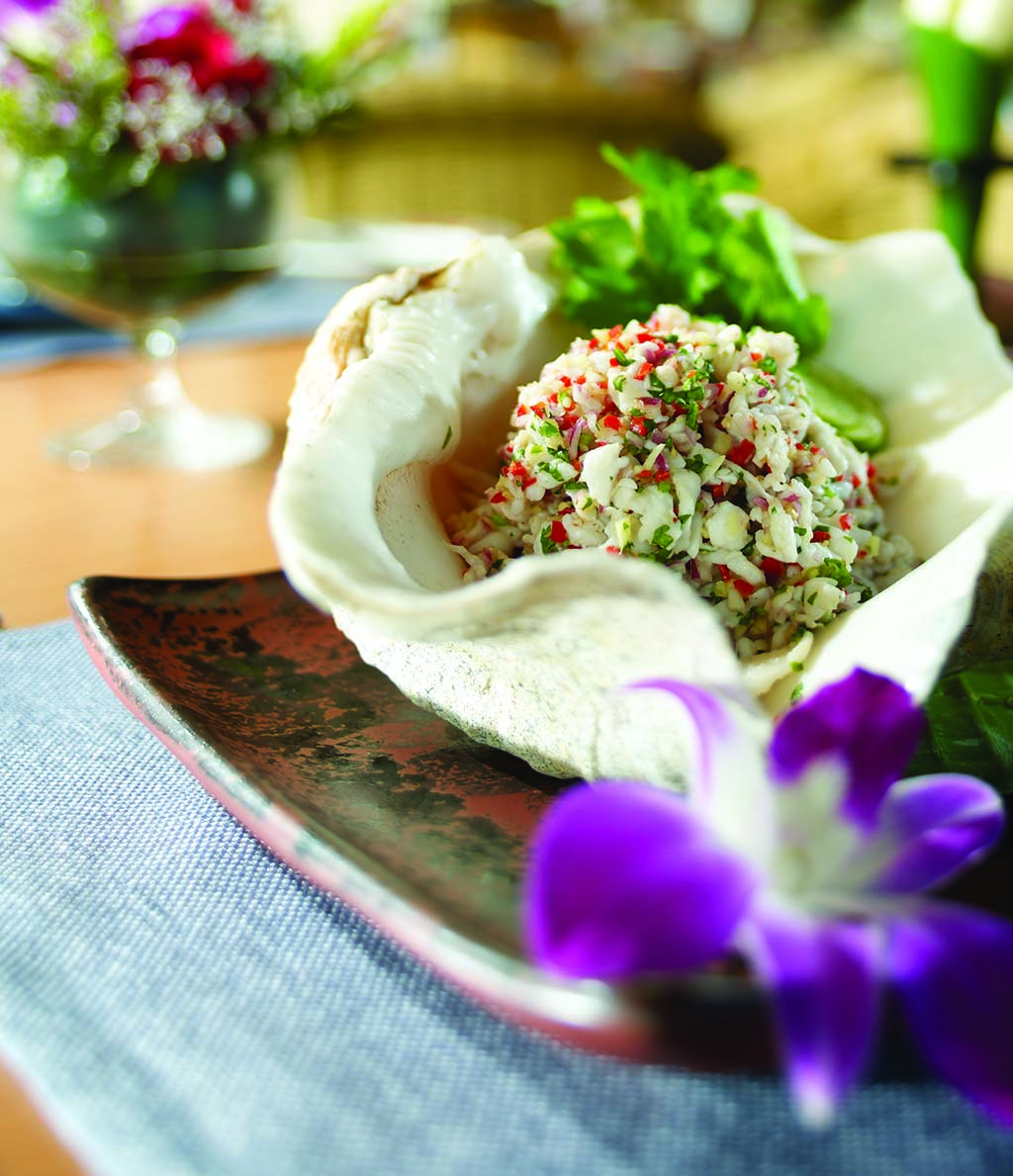
Hinava
A salad made of raw fish or prawns, hinava is especially popular among the Kadazandusun community. The essential ingredient in hinava is bambangan, or grated seeds of a wild mango that is indigenous to Sabah.
Tuhau
Another dish for the health conscious, tuhau is a fresh salad made from a ginger-like plant. It is pounded and mixed with lime juice, onions and chillies. Tuhau can be eaten by itself, or savoured together with rice.
Kelupis
Aromatic, filling and delicious, kelupis is made of glutinous rice wrapped in a fragrant leaf called daun nyirik. It is cooked in coconut milk.
TRANSPORTATION
Getting There
By Air
Sabah is well-connected domestically and internationally. The main gateway to Sabah is the Kota Kinabalu International Airport (KKIA) situated about 20 minutes away from the city. Malaysia Airlines, AirAsia and Malindo Air provides daily direct flights to Sabah from Kuala Lumpur, Malaysia’s capital city. Internationally, Sabah is accessible from Brunei Darussalam, China, Hong Kong, Taipei, Japan, Thailand, Philippines, Singapore and South Korea. The flights that operate here include Silk Air, Royal Brunei Airlines, Korean Air, Dragonair and Asiana. Visitors from Australia can also arrive in Sabah via Kuala Lumpur.
Sabah has a second airport called the Low Cost Carrier Terminal or Terminal Two. This terminal is situated about 7km from Kota Kinabalu International Airport. The budget carrier AirAsia operates from this terminal.
By Sea
Visitors from Labuan, Indonesia and Philippines can arrive in Sabah by sea. Ferry terminals and immigration checkpoints are situated at Kota Kinabalu, Sandakan and Tawau.
The Sutera Harbour Marina in Kota Kinabalu welcomes foreign guests who wish to berth their yachts in comfort and convenience. Vessels are required to do port clearance before their crew is allowed ashore.
By Land
Overland travel between Kota Kinabalu, Kuching and Brunei Darussalam is possible via the Trans Borneo Highway. However, visitors are advised to be prepared for long journeys. Those who are intending to self-drive should plan their routes and rest stops.
Getting Around
Local buses and taxis are easily available in Kota Kinabalu although tour operators normally arrange most of the overland transfers. The local train service (called Jungle Train) that connects Tanjung Aru to Beaufort and Tenom is a refreshing alternative to enjoy the scenery.
A good network of rural air service connects Kota Kinabalu to the gateway towns of Sandakan, Tawau and Lahad Datu. The smaller towns of Kudat and Semporna are equipped with airstrips.
| For more information, contact: | |
|---|---|
Tourism Malaysia Tourist Information Centre:
|
+6088-413 359 |
